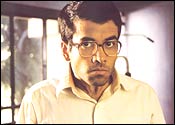 If Tusshar Kapoor turned invisible for one day he would "spend time with somebody I cant."
If Tusshar Kapoor turned invisible for one day he would "spend time with somebody I cant."
That's not all. He would also do things he is otherwise "inhibited about" first.
With a mischievous glint in his eyes, Tusshar wishfully adds, "I would find out all the ghaplas [scams] that happen within the industry. I would find out about distributors who aren't honest in their dealings and catch all the foul play within the industry".
Clearly, the invisibility bug has bitten this Kapoor. In his new film, Gayab, the actor plays a guy who has "nothing extraordinary about him". Till, of course, he turns invisible.
In an interview with Senior Correspondent Sukanya Verma, Jeetendra's soft-spoken son talks about his transformation into a "failure" for Prawaal Raman's Gayab and why he can't do with or without Bollywood.
How did you bag Gayab?
I had just come back from the first schedule of Khakee. I was just sitting in my room when I got a call from a distributor whom we know very well. He is a family friend who deals with [Gayab's creative producer] Mr [Ram Gopal] Varma . He told me Mr Varma is thinking about you for something. He wants to meet you. I said 'Yeah, anytime'. I didn't get a call for a week or two.
I went to see Bhoot for a trial show. I called Mr Varma to tell him that I really liked the film. That's when he told me 'I wanted to meet you. I am out of town now. I'll get back and call you'. Three days I got a message that I'd like to meet you in my office'. I came here [Varma's office, Factory]. That's when he told me about this idea [the plot of Gayab]. I said I was very keen. We had a couple of meetings after that and I was on board.
![]()
Gayab on rediff.com:
![]()
![]()
![]()
![]()
Gayab: A preview![]()
Tusshar: The invisible man!![]()
![]()
![]()
How would you describe your character in Gayab?
If you see the promos, they exactly summarise what my character is about. It's very different. The film is totally centred around my character called Vishnu Prasad. It's about his life and his experiences. He is very lovable. A character that evokes sympathy -- one that kids will really take to.
He is essentially, someone I would sum it up as, a failure. He is being rejected from all corners. The kind of rejection, which one would never want to face. That's when he reaches a breaking point in his life. Things really change for him.
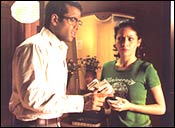 And he turns invisible?
And he turns invisible?
Uh, I wouldn't say exactly 'turns' invisible. Yes, there is the invisibility factor. But things happen to him in a very realistic manner. It's not like he finds this gadget or formula or something.
There is a supernatural element to Gayab?
Yeah, definitely.
Isn't Vishnu Prasad in Gayab is a complete loser? Even his appearance suggests
[Interrupts] That he is very common, very inconspicuous. He wouldn't stand out in a crowd. His biggest shame is that he is so common, so average. There is nothing extraordinary about him. He is your typical boring salesman whom you see every morning and don't want to attend to and you probably bang the door on his face. There's nothing special about him.
How did you go about creating your look in the film?
I worked on the look myself. I did a lot of research. I watched a lot of films. I looked through magazines about nerdy characters. I brainstormed a lot. I went through the Internet. I researched through books. Then I made certain sketches. I kind of designed a certain look for the character. I discussed with Ramuji [Ram Gopal Varma]. He gave his feedback to me. I tried out glasses. I tried out different hairstyles -- what kind of hair should this character have. And then we zeroed on in this particular look.
In a film industry where heroes are so conscious about their image, were you at any point reluctant to take up this role?
I was never apprehensive about being slotted in a certain image because this character is so strong. It leads so strongly towards that side of human personality. That one would get scared to play such a character. But it was too tempting an offer [to say no to].
I wanted to do something different. I needed a change of image. I was doing the conventional bit too often. I needed something experimental. I needed something that would challenge me, excite me, and spur me on to try and extract the juice out of the character in my performance. That's why I took it [Gayab] up.
If I work hard, I can do something unconventional. Like Khakee, people couldn't expect from me: playing a cop.
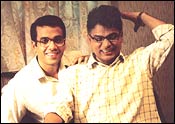 Tell us about your co-stars in Gayab.
Tell us about your co-stars in Gayab.
I have had a really good time working with all of them. I have had some really good scenes with Mr Raghuvir Yadav [who plays Tusshar's father in Gayab, right] in this film. He is a fabulous actor. And there are some really good interactions between us, which people will really enjoy.
Antara [Mali] was also a blast [to work with]. My scenes with her are mostly very light and fun. She is a very intelligent and studied actress. She gets into the depth of her character and scene. That kind of motivates the other actor. She was a refreshing change from many other heroines I have worked who are not so interested.
How different is Prawaal Raman's style of directing a film different from say a Satish Kaushik or a Rajkumar Santoshi?
Satishji is a very inspired director. He likes to make his actors work very, very hard. And that is what is similar with Prawaal. He also doesn't compromise at all. Of course, Rajkumar Santoshi also [doesn't compromise].
They all have this similarity that they all want to get the best out. No scene is casual enough for them to take just lightly. They take everything very seriously.
What differentiates Prawaal [from Kaushik and Santoshi] is that he tries to present every scene very unconventionally, which I haven't experienced with many directors before this. Technically, he is very unique. His style, although commercial, earthy, takes you in another world. That's what makes him special.
On the other hand, despite this being his second film [the first was Darna Mana Hai], he has the knack of inspiring an actor without firing or screaming. He has a very positive temperament on the sets. Working with him has been a complete blast. I actually looked forwards to the shifts of Gayab.
Whenever I have shot for Gayab, it's been like a holiday. We haven't had fun as such [in the literal sense] on the set. The thrill of the work was so much, it seemed like we were on an adventurous trip.
What was it like working in a Ram Gopal Varma production?
The quality consciousness in Varma Productions is much higher than anywhere else. I think Khakee was another film I saw which had a lot of quality consciousness and aesthetic sense.
[During Gayab] Nothing was left loose. Look was important as well as the body language and the necessity of songs. Everything has to be just right. Everything is very classy. That is something I can vouch for, which I haven't seen in many producers and directors before this.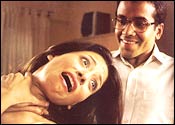
Working with Ramuji has given me an idea that every role I do now I'll go through these stages of working on the look, my body language and get more involved as far as my character is concerned.
It's like another school altogether. You come out learning so much.
Have you seen the finished version of Gayab as yet?
I haven't seen it one go. I have just seen while dubbing for the film.
Earlier you mentioned your performance in Khakee. You got good reviews for your performance in the film. Did you anticipate such a response?
I knew my work would be appreciated because Mr [Rajkumar] Santoshi's actors are always really liked. Their performances have always worked. But I didn't know [my] last scene in the film would make such an impact. That was really surprising and [at the same time] thrilling for me. I was really doubtful about that scene.
Khakee was a very good movie. That's something I really cherish. I got a lot out of that film: a lot of respect, a lot of benefits of smart presentation. As I was saying, no one could think of me playing an inspector but I did that with Khakee. Now with Gayab, it's something else. I don't think I am going to be stuck in any kind of a mould. After these two films, people are going to think, 'Look, we can experiment with him. We can make him do things we didn't think he could do.'
Did you feel you were getting stuck with the boy-next-door image?
Yeah, everybody wanted to make a Mujhe Kucch Kehna Hai. Everybody wanted to repeat that. And I was getting bored. Every time I started work on a film, I was like 'Oh no, not again'. That same college thing, Switzerland song, foreign location and emotional scene in the end. That typical format of shaadi, baraat -- everyone trying to make a college romance like Mujhe Kucch Kehna Hai that at the same time apes a Karan Johar film. That is something I wanted to get out of. I would love to do a song and dance, family-oriented college romance if it's made refreshingly and smartly. It has to be very well directed and a good banner.
Do you show your dad all your films?
Yeah. I think he has seen all my films.
Is he encouraging?
He [My father] is extremely encouraging. He really likes my work. He has never criticised me. And that is what I don't like. I like to be told what's not nice. He has always been very, very encouraging. Although he thinks I am over selective about my work. He says I should take up more work. You shouldn't be so choosy. You never know what works and what doesn't work.
We have a different approach towards certain aspects of filmmaking. More or less, he is very happy with the way I am conducting my career.
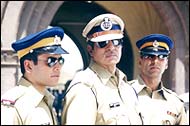 How has the going been from Mujhe Kucch Kehna Hai to Gayab?
How has the going been from Mujhe Kucch Kehna Hai to Gayab?
There have been ups and downs. It's been fun all the way. I have worked on films that haven't done well also. And I have worked hard on them. I have been more or less satisfied with my work. There's always been something I have gotten from every film, irrespective of whether it was a hit or a flop. It has helped me move forward.
I haven't jumped up after Mujhe Kucch Kehna Hai. But I haven't gone down either. I have maintained my position. I have gained respect with Khakee (left above). Now Gayab [after the promos came out] is also being liked.
It's been a smooth as well as bumpy ride. As they say, it's a big bad world of films. You can't do with it. You can't do without it.








More from rediff